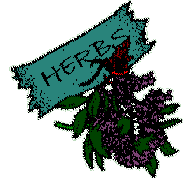 Herbs--G
Herbs--G 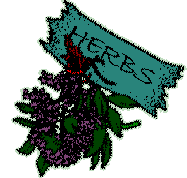
 |
Common Names: Garlic Latin Name: Allium sativum Parts Used: Bulbs Cultivation: Plant cloves in spring or the fall for a fall harvest. Garlic likes rich, dry soil in full sun to part shade. Culinary Uses: Garlic adds zest to every kind of food except desserts. Roast cloves whole in their skins to spread on toast. Toss a clove into soups and stews. Crush and use in Italian, French, and Asian dishes. Magickal Uses: Garlic is used in protection, exorcism, and healing. Hang a garlic braid over your door to repel jealous people. Place a clove beneath your child's pillow as a protection charm. Medicinal Uses: Scientists are finding many of the old folk tales about garlic's healing powers to be true. The active ingredient in garlic, allicin, which is produced when the bulb is crushed, has an antibacterial action similar to that of penicillin, and is in fact more effective than penicillin in treating typhus! It is also effective against staph and strep germs, yeast infections, influenza, cholera, and dysentery. Garlic helps to lower blood cholesterol levels and blood pressure, and inhibits blood clotting and clogging of the arteries. It even seems to have some effectiveness in treating stomach cancer! It can be used externally to treat ringworm and threadworm. Cautions: Garlic and garlic pastes should not be applied directly to the skin, as they may cause blistering. | 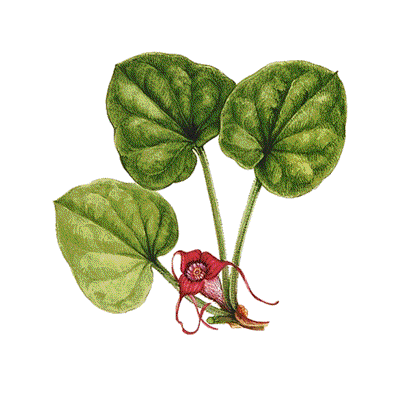 |
Common Names: Ginger Latin Name: Zingiber officinale Parts Used: Roots Cultivation: Ginger is a tropical plant only hardy to zone 9. It is a perennial, and prefers fertile, moist, well-drained soil in part sun. Culinary Uses: The flavor of ginger is a spicy citrus. The root is used in the cuisine of Asia, East India, the Caribbean, and North Africa. Sliver some fresh and add to your favorite stir-fry. Dried ginger is used in many desserts besides the traditional gingerbread. Magickal Uses: Eat ginger before doing a spell to increase its power. Grow ginger near your home or sprinkle dried ginger in your pocket or wallet to attract money. Ginger root, because of its gnarled shape, can substitue for mandrake. Medicinal Uses: Ginger is used to soothe indigestion and treat motion sickness. Ginger tea is a wonderful remedy for morning sickness! It is a diaphoretic and promotes peripheral circulation. Gargle with an infusion of ginger to treat a sore throat. Use it as a poultice to treat musccle spasms. |
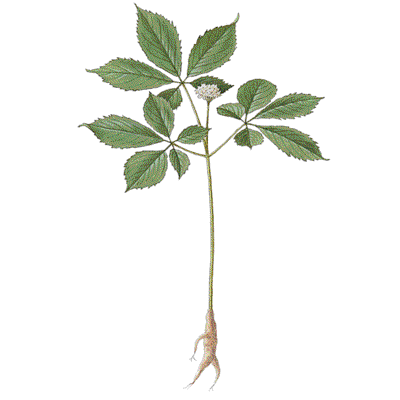 |
Common Names: Ginseng, Sang, Wonder of the World Root Latin Name: Panax quinquefolius Parts Used: Roots Cultivation: Ginseng is a hardy perennial. It likes rich, well-drained loam with a pH of 5.0 to 6.5. It is quite difficult to grow as it needs to be pampered! Magickal Uses: Ginseng is carried to attract love and guard health. Ginseng tea is said to be an aphrodisiac. Medicinal Uses: There are many claims made for ginseng's healing properties. Many of the claims involve Siberian ginseng, which is not closely related to the common version. It is used to treat exhaustion, depression, and debility. It increases vitality and physical and mental performance. Cautions: Excessive use of ginseng may cause headaches. |
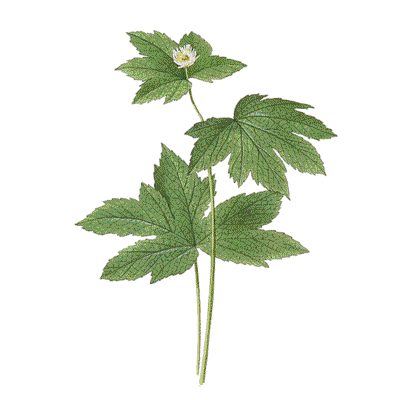 |
Common Names: Goldenseal, Eye Balm, Eye Root Latin Name: Hydrastis canadensis Parts Used: Dried leaves and stems, rhizomes Cultivation: Goldenseal is a hardy perennial woodland plant. It is very difficult to cultivate. Magickal Uses: Goldenseal is used in money spells and healing rituals. Medicinal Uses: Goldenseal has mild antiseptic, sedative, and muscle relaxant properties. Extracts of goldenseal seal to lower blood sugar levels. Goldenseal eyewash is especially effective against staph aureus and reduces inflammation. Cautions: Internal use of Goldenseal should be AVOIDED as large quantites can accumulate in the system and cause serious side effects, ranging from nausea, vomiting, and diarrhea to convulsions, respiratory failure, paralysis, and even death. |
| A | B | C | D | E | F | G | H | I | J | K | L | M | N | O | P | Q | R | S | T | U | V | W | X | Y | Z |